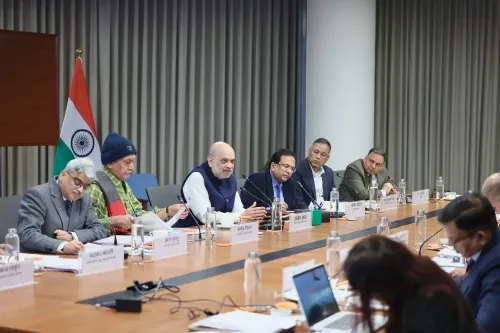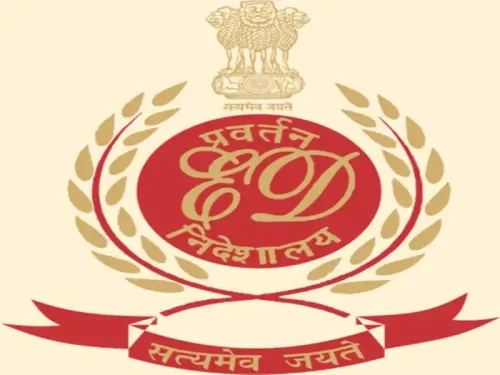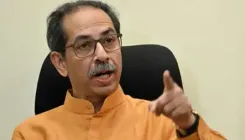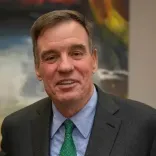How is Mohan Bhagwat Promoting Social Unity at the Manipur Tribal Leadership Meet?
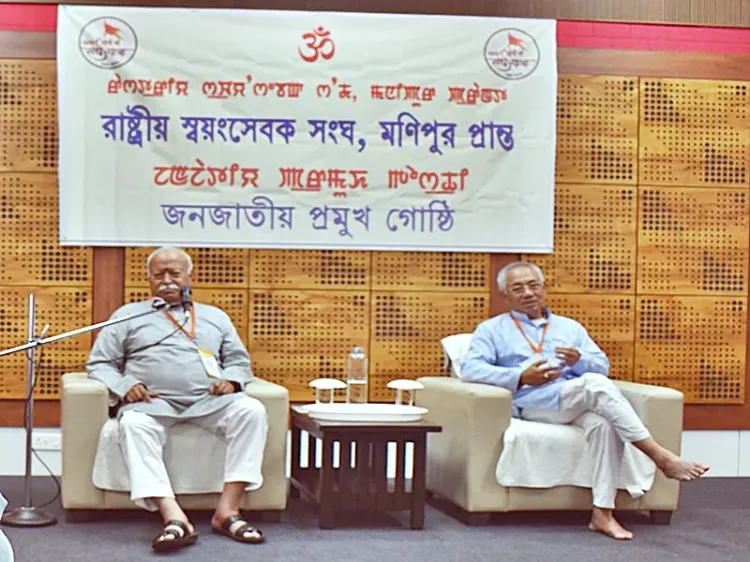
Synopsis
Key Takeaways
- Mohan Bhagwat calls for social unity among tribal leaders.
- Over 200 community leaders joined the traditional Manipuri lunch.
- RSS aims to strengthen society through character-building.
- Fraternity is highlighted as Bharat's essential dharma.
- Youth involvement in nation-building is crucial for progress.
Imphal, Nov 21 (NationPress) Mohan Bhagwat, the chief of the Rashtriya Swayamsevak Sangh (RSS), emphasized the importance of social unity during a Janajati (tribal) leadership gathering in the capital of Manipur, Imphal. On the second day of his three-day visit, Bhagwat engaged with Janajati leaders, advocating for enhanced unity and character development to foster enduring peace, harmony, and progress both in the region and across the nation.
A traditional Manipuri meal was hosted at the RSS center, 'Bhaskara Prabha' in Imphal, where over 200 leaders from various Janajati communities joined Bhagwat, exemplifying the principles of Samajik Samarasata—social equality and mutual respect. While addressing the attendees, he reaffirmed that the RSS is a purely social organization committed to fortifying society.
He stated, "RSS is not against anyone; it is not established to destroy, but to uplift society. Leaders, politics, and governments are supportive, but what society genuinely requires is unity."
Additionally, the RSS chief mentioned that the organization does not engage in political activities or control any other organization.
"RSS operates through friendship, affection, and social harmony," he said. By highlighting Bharat's civilizational continuity, he pointed out that studies show the genetic and cultural DNA of Bharat's people has remained unified for over 40,000 years.
"We are united through our shared consciousness. Despite our beautiful diversity, we are part of one civilizational family. Unity does not require uniformity," he observed.
He quoted Dr. B.R. Ambedkar, stating that the constitutional values of liberty, equality, and fraternity are rooted in the teachings of Gautam Buddha and can thrive only when fraternity—the feeling of oneness—is robust.
"Numerous nations have faltered despite having liberty and equality due to the lack of fraternity. Fraternity is Bharat's dharma," he added.
Bhagwat explained that the RSS was not formed as a reaction to external forces but to tackle internal disunity, recalling Dr. Keshav Baliram Hedgewar's commitment to unifying society. "RSS is a man-making and character-building movement," he encouraged everyone to visit shakhas to see how the Sangh operates on the ground.
He affirmed that anyone devoted to the betterment of society and committed to Bharatiya civilization is already an undeclared swayamsevak.
"RSS members are free of burdens; we seek nothing but a better society," he remarked.
Regarding the concerns raised by Janajati leaders, he assured them that their issues are national priorities. He stressed self-reliance and solutions within the constitutional framework. "Family issues must be resolved within the family. Dialogue should be based on unity, not contractual negotiations," he said, noting that many regional issues and divisions stem from historical colonial policies.
Describing manushya-nirman—the development of responsible, ethical, and socially aware individuals—as the foundation for national transformation, Bhagwat highlighted the ongoing Sadbhavana Baithaks and the Sangh's Panch Parivartan initiatives. These include Samajik Samarasata (social harmony without discrimination), Kutumb Prabodhan (strengthening family values), Paryavaran Sanrakshan (environmental conservation), Swabodh (civilizational awareness), and Nagarik Kartavya (civic responsibilities).
He encouraged Janajati leaders to take pride in their indigenous traditions, languages, and scripts, and to adopt a swadeshi lifestyle rooted in cultural identity.
"Other nations are now looking towards Bharat for guidance and civilizational alternatives. We must build a robust Rashtra, and RSS will strive tirelessly for it," he concluded. The significant dialogue among Janajati leaders and the communal meal ended with a message of cultural unity and shared responsibility, showcasing the spirit of "Ek Bharat, Shreshtha Bharat" in action.
In a separate discussion with youth leaders in Imphal, Bhagwat urged the younger generation to understand that Bharat is not a recent nation but an ancient, continuous civilization.
He pointed out that epics like the Ramayana and the Mahabharata reference regions such as Manipur, Brahmadesh, and even modern-day Afghanistan, underscoring Bharat's extensive cultural and spiritual legacy.
"Hindu civilization is built on acceptance, mutual respect, and a profound sense of shared consciousness. Our diversity is our strength because dharma unites us at the core," he stated, urging youth to take pride in their identity and lead with cultural confidence.
He encouraged youth involvement in nation-building, stating that RSS shakhas aim to cultivate responsible, capable, and selfless citizens who can contribute their skills and talents for the country. True progress, he elaborated, transitions from individual excellence to collective growth and systemic transformation. Warning against extreme materialism and self-interest, he emphasized that strong families and value-based upbringing are essential for a strong nation.
"Young minds must transcend selfish ambitions. When Bharat rises, the world rises. Our duty is to remain united and awakened as one society, with a singular resolve," he concluded.
Bhagwat's visit to Imphal commenced on Thursday and marks his first since ethnic tensions erupted in the state in May 2023.
A local RSS representative mentioned that the visit to Manipur is part of the organization's nationwide centenary celebrations, and Bhagwat received a warm welcome upon arriving at Imphal airport after a four-day trip to Assam.


